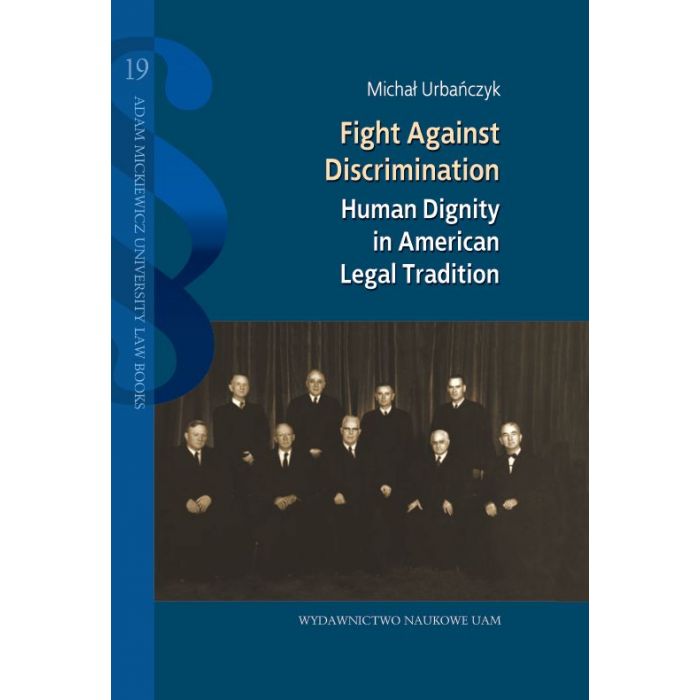Fight Against Discrimination. Human Dignity in American Legal Tradition
- Dostępność: brak w magazynie
- ISBN: 978-83-232-4116-4 (PDF)
- DOI: 10.14746/amup.9788323241164
- Kategoria: Prawo, Adam Mickiewicz University Law Books, Ebooki, Otwarty dostęp
- Data wydania: 2022


The book is a collection of essays designed to take the reader on a journey through American law and the American political and legal tradition. Their common ground is to trace the influence of the idea of human dignity on the American system of civil rights protection and to characterize more than two centuries of struggle against discrimination against various groups and minorities. Beginning with the views of the Founding Fathers and the creation of the first modern republic, through the struggles against slavery and gender discrimination, to the 20th century challenges of abortion, euthanasia, and the legalization of same-sex marriage.
Although human dignity does not appear in the Constitution or in constitutional amendments, the influence of this idea on the legal order has been, is, and will continue to be considerable. Indeed, along with liberty, equality, and justice, it is one of the core values that underlie the political, legal, and judicial system of the United States of America.
The reader will find in the book both reflections on political and legal thought, as well as a number of judgments of the Supreme Court of the United States, which established the most important legal principles expanding the sphere of individual freedoms and protecting civil rights. The reader will also find key figures in American history, such as revolutionary columnist Thomas Paine, Supreme Court Justice James Wilson, suffragist Elizabeth Cady Stanton, and African American abolitionist Frederick Douglass.
Preface and Acknowledgements
Foreword: The Idea of Human Dignity
CHAPTER 1
Human Dignity and the Origins of American Law
CHAPTER 2
The Natural Dignity of Man and Thomas Paine
CHAPTER 3
The Equal Creation of Man and Thomas Jefferson
CHAPTER 4
The Native Dignity and James Wilson
CHAPTER 5
The Civil Dignity and Francis Lieber
CHAPTER 6
Human Dignity and Frederick Douglass
CHAPTER 7
Human Dignity and Women’s Rights
CHAPTER 8
Black Codes and Years of Regression
CHAPTER 9
Forerunners of Modern Human Dignity
CHAPTER 10
Human Dignity and Japanese American
CHAPTER 11
Human Dignity and African American
CHAPTER 12
Human Dignity and Justice William J. Brennan
CHAPTER 13
Human Dignity and Social Welfare
CHAPTER 14
Human Dignity and Abortion
CHAPTER 15
The Right to Die with Dignity
CHAPTER 16
Human Dignity and Same-Sex Marriages
Conclusions: American Concept of Human Dignity
Case Citations
Literature
Książka jest zbiorem esejów, które mają zabrać czytelnika w podróż po amerykańskim prawie i amerykańskiej tradycji polityczno-prawnej. Ich wspólnym mianownikiem są odnalezienie śladów wpływu idei godności człowieka na amerykański system ochrony praw człowieka i charakterystyka ponaddwuwiekowej walki z dyskryminacją różnych grup i mniejszości. Począwszy od poglądów Ojców Założycieli i powstania pierwszej nowożytnej republiki, poprzez walkę z niewolnictwem i dyskryminacją ze względu na płeć, aż do XX-wiecznych wyzwań związanych z aborcją, eutanazją i legalizacją związków jednopłciowych.
Mimo że pojęcie godność człowieka nie wstępuje ani w Konstytucji, ani w poprawkach do niej, wpływ tej idei na porządek prawny był, jest i będzie niebagatelny. Obok wolności, równości i sprawiedliwości jest ona bowiem jedną z zasadniczych wartości, które stanowią fundament ustroju, prawa i wymiaru sprawiedliwości Stanów Zjednoczonych Ameryki.
Czytelnik w książce znajdzie rozważania dotyczące zarówno myśli politycznej i prawnej, jak i szeregu orzeczeń Sądu Najwyższego USA, które ustanowiły najważniejsze zasady prawne, poszerzając sferę wolności jednostki, i chroniły jej prawa obywatelskie. W treści czytelnik odnajdzie także postacie kluczowe dla amerykańskiej historii, jak rewolucyjnego publicystę Tomasza Paine’a, sędziego Sądu Najwyższego Jamesa Wilsona, sufrażystkę Elizabeth Cady Stanton czy wyzwoleńca i wybitnego abolicjonistę Fredericka Douglassa
| Informacje szczegółowe | |
|---|---|
| Introduction |
Pobierz plik

|
| Contents |
Pobierz plik

|
|
|
|
| Wersja publikacji | e-book, otwarty dostęp |
| Język | angielski |
| Typ publikacji | Monografia |
| Wydanie | I |
| Seria | Adam Mickiewicz University Law Books no. 19 |
| ISBN | 978-83-232-4116-4 (PDF) |
| DOI | 10.14746/amup.9788323241164 |
| Liczba stron | 200 |
| Liczba arkuszy wydawniczych | 14,50 |
